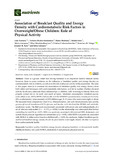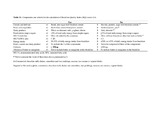Mostrar el registro sencillo del ítem
Association of breakfast quality and energy density with cardiometabolic risk factors in overweight/obese children: role of physical activity
| dc.creator | Arenaza, Lide | es_ES |
| dc.creator | Muñoz-Hernández, Victoria | es_ES |
| dc.creator | Medrano Echeverría, María | es_ES |
| dc.creator | Osés Recalde, Maddi | es_ES |
| dc.creator | Amasene, María | es_ES |
| dc.creator | Merchán Ramírez, Elisa | es_ES |
| dc.creator | Cadenas-Sánchez, Cristina | es_ES |
| dc.creator | Ortega, Francisco B. | es_ES |
| dc.creator | Ruiz, Jonatan R. | es_ES |
| dc.creator | Labayen Goñi, Idoia | es_ES |
| dc.date.accessioned | 2019-07-01T09:27:39Z | |
| dc.date.available | 2019-07-01T09:27:39Z | |
| dc.date.issued | 2018 | |
| dc.identifier.issn | 2072-6643 | |
| dc.identifier.uri | https://hdl.handle.net/2454/33531 | |
| dc.description.abstract | There is a general belief that having breakfast is an important healthy lifestyle factor; however, there is scarce evidence on the influence of breakfast quality and energy density on cardiometabolic risk in children, as well as on the role of physical activity in this association. The aims of this paper were (i) to examine the associations of breakfast quality and energy density from both solids and beverages with cardiometabolic risk factors, and (ii) to explore whether physical activity levels may attenuate these relationships in children with overweight/obesity from two projects carried out in the north and south of Spain. Breakfast consumption, breakfast quality index (BQI) score, BEDs/BEDb (24 h-recalls and the KIDMED questionnaire), and physical activity (PA; accelerometry) were assessed, in 203 children aged 8-12 years who were overweight or obese. We measured body composition (Dual X-ray Absorptiometry), uric acid, blood pressure, lipid profile, gamma-glutamyl-transferase (GGT), glucose, and insulin, and calculated the HOMA and metabolic syndrome z-score. The BQI score was inversely associated with serum uric acid independently of a set of relevant confounders (= -0.172, p = 0.028), but the relationship was attenuated after further controlling for total PA (p < 0.07). BEDs was positively associated with total and HDL cholesterol, and systolic blood pressure regardless of confounders (all p < 0.05), while BEDb was positively associated with HOMA in either active/inactive children (all p < 0.03). In conclusion, higher breakfast quality and lower breakfast energy density should be promoted in overweight/obesity children to improve their cardiometabolic health. | en |
| dc.description.sponsorship | EFIGRO and ActiveBrains projects were supported by the Spanish Ministry of Industry and Competitiveness (DEP2016-78377-R and DEP2013-47540) by "Fondos Estructurales de la Union Europea (FEDER), Una manera de hacer Europa". The EFIGRO project was also supported by the University of the Basque Country (GIU14/21). LA was supported by a grant from the Education Department of the Government of Basque Country (PRE_2016_1_0057 and PRE_2017_2_0224), MM is supported by a grant from the Spanish Ministry of Education, Culture, and Sport (FPU14/03329) and EST17/00210, MO was supported by a grant from the Spanish Ministry of Science, Innovation, and Universities (BES-2017-080770), whereas MA was supported by a grant from the University of the Basque Country (PIF 17/186). JRR, FBO, and CC-S were also supported by grants from the Spanish Ministry of Economy and Competitiveness (RYC 2010-05957; RYC-2011-09011 and BES-2014-068829). | en |
| dc.format.extent | 13 p. | |
| dc.format.mimetype | application/pdf | en |
| dc.language.iso | eng | en |
| dc.publisher | MDPI | en |
| dc.relation.ispartof | Nutrients, 10 (8) | en |
| dc.rights | © 2018 by the authors. Licensee MDPI, Basel, Switzerland. This article is an open access article distributed under the terms and conditions of the Creative Commons Attribution (CC BY) license. | en |
| dc.rights.uri | http://creativecommons.org/licenses/by/4.0/ | |
| dc.subject | Breakfast quality | en |
| dc.subject | Breakfast energy density | en |
| dc.subject | Skipping breakfast | en |
| dc.subject | Cardiometabolic health | en |
| dc.subject | Childhood obesity | en |
| dc.subject | Uric acid | en |
| dc.subject | HOMA | en |
| dc.subject | Cholesterol | en |
| dc.subject | Blood pressure | en |
| dc.subject | Physical activity | en |
| dc.title | Association of breakfast quality and energy density with cardiometabolic risk factors in overweight/obese children: role of physical activity | en |
| dc.type | info:eu-repo/semantics/article | en |
| dc.type | Artículo / Artikulua | es |
| dc.contributor.department | Institute on Innovation and Sustainable Development in Food Chain - ISFOOD | es_ES |
| dc.rights.accessRights | info:eu-repo/semantics/openAccess | en |
| dc.rights.accessRights | Acceso abierto / Sarbide irekia | es |
| dc.identifier.doi | 10.3390/nu10081066 | |
| dc.relation.projectID | info:eu-repo/grantAgreement/ES/1PE/DEP2016-78377-R | en |
| dc.relation.projectID | info:eu-repo/grantAgreement/MINECO//DEP2013-47540-R/ES/ | en |
| dc.relation.publisherversion | https://doi.org/10.3390/nu10081066 | |
| dc.type.version | info:eu-repo/semantics/publishedVersion | en |
| dc.type.version | Versión publicada / Argitaratu den bertsioa | es |




